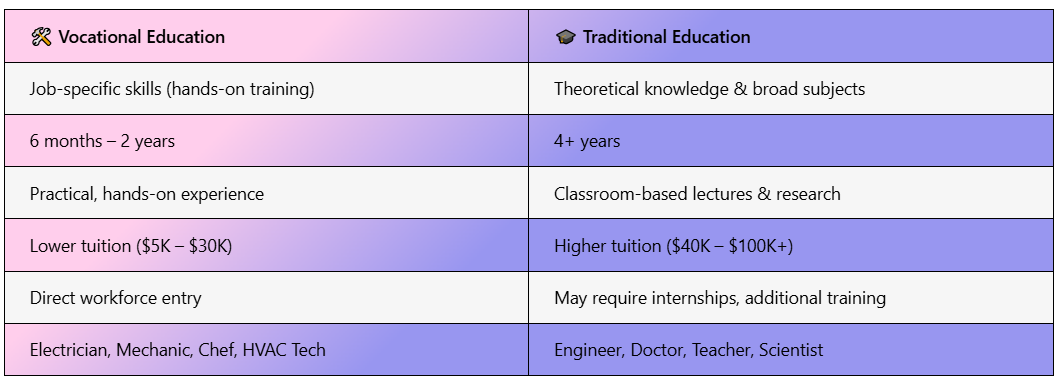
Understanding the Vocational Meaning
Understanding the vocational meaning in education is crucial for those seeking a practical and rewarding career path. Vocational education equips students with specific skills and knowledge tailored to various trades or professions. Unlike traditional academic routes that emphasize theoretical knowledge, vocational training programs are designed to prepare individuals directly for the workforce. This hands-on approach enables students to gain real-world experience and develop competencies that employers highly value. Vocational training programs cover a wide range of fields, including healthcare, construction, culinary arts, and information technology.
For example, a student aspiring to become an electrician might enroll in a trade school program that combines classroom instruction with on-the-job training. This combination ensures that graduates are not only knowledgeable but also skilled in applying their expertise in practical settings. Here are some key benefits of pursuing vocational education:
- Direct Career Preparation: Students are specifically trained for their chosen careers, making them job-ready upon graduation.
- Shorter Duration: Many vocational programs can be completed in one to two years, allowing for quicker entry into the workforce.
- Cost-Effective: Vocational education typically costs less than traditional college degrees, helping to reduce student debt.
- High Demand for Skilled Workers: Many industries actively seek skilled tradespeople, leading to strong job prospects.
- Hands-On Learning: Students gain practical experience that enhances their employability.
By understanding the vocational meaning in education, individuals can embark on a fulfilling career journey that aligns with their interests and the job market’s needs.
Unlock your potential with online degrees—Learn more!
The Importance of Vocational Training for Career Success
Vocational education is essential for individuals aiming to enter the workforce with practical skills. But what does vocational mean in education? It refers to training programs that equip students with specific skills and knowledge for particular trades or careers. This education emphasizes hands-on experience and real-world applications, making it a vital pathway for those looking to excel in various industries. The significance of vocational training for career success is immense. Here are some key benefits of pursuing vocational training programs:
- Skill Development: Students acquire practical skills directly applicable to their chosen field.
- Job Readiness: Graduates are often better prepared for the workforce, having completed internships or apprenticeships.
- Higher Earning Potential: Many trade school programs lead to lucrative careers, often matching the salaries of traditional four-year degrees.
- Shorter Duration: Vocational programs usually take less time to complete than traditional degrees, enabling students to enter the job market sooner.
Real-world examples underscore the effectiveness of vocational training. Electricians, plumbers, and automotive technicians often complete trade school programs that equip them with necessary skills. These professionals are in high demand, and their specialized training allows them to command competitive salaries. In a constantly evolving job market, vocational education emerges as a practical and rewarding option for many aspiring workers. By choosing this path, individuals not only enhance their career prospects but also contribute to a skilled workforce that drives economic growth.
Key Differences Between Vocational and Traditional Education

Vocational education focuses on practical skills and hands-on training, preparing students for specific careers. Unlike traditional education, which emphasizes theoretical knowledge, vocational programs enable quicker entry into the workforce. These programs provide targeted education that aligns with industry demands, making graduates highly employable. A key difference between vocational and traditional education is the curriculum.
Vocational training often combines classroom instruction with real-world experience. For example, trade school programs may include learning plumbing or electrical work through lectures and apprenticeships. This blend ensures students grasp both the theory and practical skills necessary for success. Here are some benefits of vocational education:
- Focused Learning: Concentrates on specific skills relevant to career paths.
- Shorter Duration: Many programs can be completed in one to two years, facilitating quicker job market entry.
- Higher Employment Rates: Graduates often find jobs more easily due to the demand for skilled workers in trades. In contrast, traditional education typically involves a broader curriculum that may not directly relate to job skills, often delaying workforce entry. While this approach has its merits, it may not suit everyone, especially those eager to start working sooner.
Ultimately, the choice between vocational and traditional education depends on individual goals and career aspirations. If you prefer hands-on learning and want to enter the job market quickly, vocational training could be the right path for you.
How Vocational Programs Prepare Students for the Workforce
Vocational education is essential for preparing students for the workforce by providing practical skills and knowledge tailored to specific careers. So, what does vocational mean in education? It refers to training programs designed to equip students with the skills necessary for particular trades or professions.
These programs bridge the gap between academic learning and real-world application, making them appealing to students who prefer hands-on experiences. Vocational training programs are often offered through trade schools, community colleges, or specialized institutions and cover a wide range of fields, including healthcare, automotive technology, culinary arts, and information technology. Here are some key benefits of vocational education:
- Hands-on experience: Students engage in practical training that reflects real job scenarios.
- Industry connections: Many programs collaborate with local businesses, offering networking opportunities and potential job placements.
- Shorter duration: Vocational programs typically take less time to complete than traditional four-year degrees, allowing students to enter the workforce sooner.
Moreover, vocational programs emphasize soft skills such as communication, teamwork, and problem-solving, which are vital in any workplace. For example, a culinary arts student learns not only how to cook but also how to work efficiently in a team and manage time effectively. This holistic approach ensures that graduates are not only skilled in their trade but also well-rounded individuals ready to face the challenges of the workforce.
Exploring Various Vocational Education Pathways
Vocational education is essential in shaping students’ futures by equipping them with practical skills and knowledge tailored to specific careers. So, what does vocational mean in education? It refers to training programs designed to prepare individuals for skilled trades or technical jobs. These programs emphasize hands-on experience and real-world applications, making them ideal for those seeking a direct path to employment instead of traditional academic routes.
Exploring various vocational education pathways can unlock numerous opportunities in fields such as healthcare, construction, and technology. One of the most attractive features of vocational training programs is their efficiency. Many can be completed in a shorter time frame than a four-year degree. Here are some key benefits of pursuing vocational education:
- Focused Learning: Students acquire specific skills directly applicable to their careers.
- Job Readiness: Graduates are often better prepared for the workforce, having completed internships or practical projects.
- Diverse Options: There is a wide range of choices, from trade school programs in plumbing and electrical work to culinary arts and automotive technology.
Numerous real-world examples highlight successful vocational education pathways. Community colleges frequently offer programs leading to certifications in fields like nursing or information technology. Trade schools provide specialized training for high-demand jobs, such as electricians or HVAC technicians. By opting for a vocational path, students not only gain valuable skills but also help address the skills gap in various industries, making vocational education a crucial part of the modern workforce.
Unlock your potential with online degrees—Learn more!
Benefits of Choosing a Vocational Education Route
Vocational education focuses on practical skills and hands-on training, preparing students for specific trades or careers. This type of education is delivered through vocational training programs or trade school programs, emphasizing real-world applications over theoretical knowledge. Students learn by doing, which is increasingly beneficial in today’s job market. Opting for a vocational education route offers numerous advantages.
For one, it often leads to quicker entry into the workforce. Many vocational programs can be completed in just one or two years, allowing students to start earning sooner than those pursuing traditional four-year degrees. Here are some key benefits of vocational education:
- Cost-Effective: Vocational programs are generally less expensive than traditional college degrees.
- High Demand: Many skilled trades are in high demand, leading to quicker job placements for graduates.
- Hands-On Experience: Students acquire practical skills that employers seek, making them job-ready upon graduation.
Real-world examples highlight the effectiveness of vocational education. For instance, a student in a plumbing trade school program learns about systems and codes in the classroom while gaining hands-on experience through apprenticeships. This combination not only equips them with essential skills but also builds confidence as they prepare to enter the workforce. In summary, vocational education provides a practical pathway to a fulfilling career, making it a smart choice for many students.
Read Also: What Are the Top Platforms for Personalized Learning?
Vocational Education and Its Impact on Economic Growth
Vocational education is vital for shaping the workforce and fostering economic growth. But what does vocational mean in education? It refers to training programs that equip individuals with specific skills for various trades or careers, preparing them for immediate employment in fields like healthcare, construction, and technology.
By emphasizing practical skills and hands-on experience, vocational training programs effectively bridge the gap between education and the job market, making them essential in modern education systems. One of the key impacts of vocational education is its ability to meet the evolving demands of the economy. As industries change, the need for skilled workers becomes increasingly important. Trade school programs offer targeted training that aligns with current job market needs. Here are some benefits of vocational education:
- Job Readiness: Graduates are often ready to enter the workforce right after completing their programs.
- Higher Employment Rates: Many vocational programs have higher employment rates compared to traditional degree paths.
- Economic Contribution: Skilled workers play a crucial role in driving economic growth by filling essential positions across various sectors. Real-world examples highlight the effectiveness of vocational education.
In Germany, the dual education system combines classroom learning with practical training, leading to low youth unemployment rates. In the United States, community colleges offer vocational programs tailored to local industry needs, helping to revitalize economies. Investing in vocational education empowers individuals and strengthens economies, creating a win-win situation for all.
Future Trends in Vocational Education and Training
Vocational education and training, often referred to as VET, plays a crucial role in preparing individuals for specific careers. But what does vocational mean in education? Essentially, it focuses on equipping students with practical skills and knowledge tailored to particular trades or professions. This approach is increasingly relevant in today’s job market, where employers seek candidates with hands-on experience and specialized training.
As we look to the future, vocational training programs are evolving to meet the demands of a rapidly changing economy. One of the most exciting trends in vocational education is the integration of technology. Trade school programs are now incorporating digital tools and online learning platforms, making education more accessible and flexible.
For instance, students can learn about advanced manufacturing techniques through virtual simulations or participate in online courses that complement their hands-on training. This blend of traditional and modern methods not only enhances learning but also prepares students for the tech-savvy workplaces of tomorrow. Here are some key benefits of pursuing vocational education:
- Job Readiness: Graduates are often job-ready, having gained practical experience in their field.
- Shorter Duration: Many vocational programs can be completed in a shorter time frame compared to traditional degrees, allowing students to enter the workforce sooner.
- Higher Earning Potential: Skilled trades often offer competitive salaries, sometimes exceeding those of four-year degree holders.
- Diverse Opportunities: From healthcare to information technology, vocational training opens doors to a wide range of career paths.
Unlock your potential with online degrees—Learn more!
FAQs
-
What does “vocational” mean?
“Vocational” refers to education, training, or skills that prepare individuals for specific trades or careers, often focusing on hands-on learning and practical applications. -
How is vocational education different from traditional education?
Vocational education focuses on job-specific training, while traditional education (such as a university degree) emphasizes theoretical knowledge and broader academic subjects. -
What are some examples of vocational careers?
Examples include electricians, plumbers, mechanics, chefs, medical assistants, cosmetologists, carpenters, and IT technicians. -
Is vocational training only for students who don’t go to college?
No, vocational training can benefit anyone, including those who want a faster career path, hands-on learning, or additional certifications alongside a college degree.






